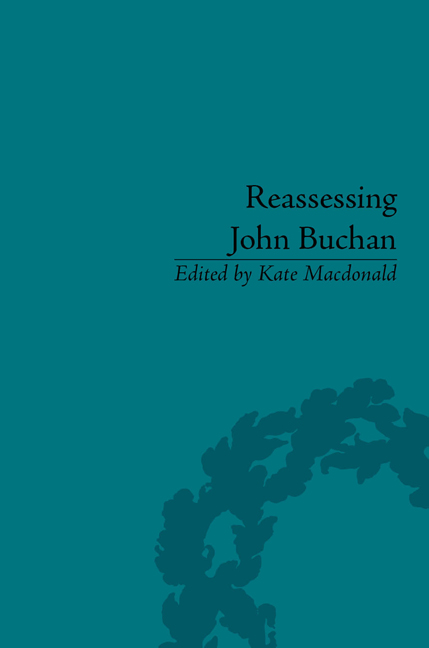Book contents
- Frontmatter
- CONTENTS
- List of contributors
- Introduction
- I Cultural Roots
- II Divided Loyalties
- III Literary Art
- 12 ‘A Fraud Called John Buchan’: Buchan, Joseph Conrad and Literary Theft
- 13 Aphrodite rejected: Archetypal Women in Buchan's Fiction
- 14 John Buchan: Politics, Language and Suspense
- 15 Buchan's Supernatural Fiction
- 16 The Anarchist's Garden: Politics and Ecology in John Buchan's Wastelands
- 17 Tracing The Thirty-Nine Steps
- Notes
- Works Cited
- Index
17 - Tracing The Thirty-Nine Steps
from III - Literary Art
- Frontmatter
- CONTENTS
- List of contributors
- Introduction
- I Cultural Roots
- II Divided Loyalties
- III Literary Art
- 12 ‘A Fraud Called John Buchan’: Buchan, Joseph Conrad and Literary Theft
- 13 Aphrodite rejected: Archetypal Women in Buchan's Fiction
- 14 John Buchan: Politics, Language and Suspense
- 15 Buchan's Supernatural Fiction
- 16 The Anarchist's Garden: Politics and Ecology in John Buchan's Wastelands
- 17 Tracing The Thirty-Nine Steps
- Notes
- Works Cited
- Index
Summary
Published in 1915 and still in print almost one hundred years later, The Thirty-Nine Steps is the novel most identified with John Buchan, and represented as much of a challenge to its author as the fictional challenges facing Richard Hannay. Begun at a time when Buchan suffered from ill-health and was unable to join the army, The Thirty-Nine Steps represented the second version of his attempt at writing a ‘shocker’ begun by The Power-House (first published in Blackwood's Magazine in December 1913) as well as a further exploration of themes from his first contemporary novel The Half-Hearted (1900). Like The Half-Hearted, The Thirty-Nine Steps appeared in the context of a threatening world stage where the Great Game took on more ominous overtones.
Buchan's most celebrated work is as much concerned with the problems of citizenship and masculinity as it is with the Great Game. At the end of The Half-Hearted, its hero Lewis Haystoun dies a heroic death, having overcome debilitating character flaws defined by the title of the novel. In the concluding sentence of The Thirty-Nine Steps, Richard Hannay expresses personal satisfaction for his role in solving the enigma within the novel's title. ‘But I had done my best service, I think, before I put on khaki.’ Hannay had served his country impeccably, but he had also served himself by bringing out the better qualities of his nature and overcoming negative features within his own personality.
The Thirty-Nine Steps is a highly accomplished novel. In film studies it is generally cited to emphasize the distinctive features of its most celebrated cinematic adaptation by Alfred Hitchcock, rather than for its literary merit. Hitchcock borrowed from Buchan the theme of a ‘wrong man’ unjustifiably accused of a crime, thrust into a world of chaos far removed from his everyday existence until balance becomes restored at the end. In The Thirty-Nine Steps, Buchan repeats the paradox of The Power-House in which Sir Edward Leithen struggles to escape his pursuers in the normal surroundings of a familiar London by placing most of the pursuit in Scotland.
- Type
- Chapter
- Information
- Reassessing John BuchanBeyond the Thirty Nine Steps, pp. 207 - 218Publisher: Pickering & ChattoFirst published in: 2014



